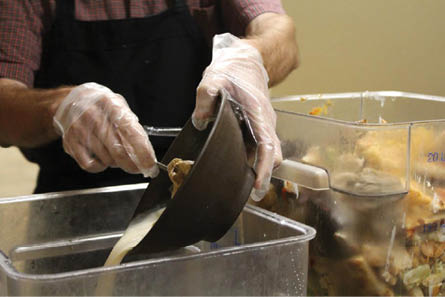Food waste increased this semester compared to the amount measured during last semester’s Weigh the Waste event, and feedback about meals could be the solution
This semester’s Weigh the Waste event found food waste was twice the amount as last semester’s. Students and faculty who participated measured 322 pounds of waste in a single day in Thomson Cafe. The event, held on Oct. 5, raised awareness to Winthrop students regarding their food waste and its consequences. Wasting food wastes the embodied energy — the energy to harvest and transport food — in that particular food.
“The environmental implications stem from the fact that when the wasted food decomposes, it releases methane that is extremely damaging to the atmosphere,” Connor Amick, Winthrop’s Student Environmental Action Coalition co-president, said. “The ethical implications are the fact that children in the Rock Hill area are going hungry and we are not grateful for the food we have.”
Amick participated in the event and said the waste likely increased because one meal was universally disliked which inflated the weight. Students who eat in Thomson have the option of giving feedback about the meals by taking daily surveys found at YourDiningVoice.com listed on cards in the cafeteria. Participants could win a $50 Visa gift card by completing the surveys, which assist in creating the menus for Thomson.
Bree Boyd, a Winthrop junior, said her favorite meals in Thomson have been the sweet potatoes, rice with coconut and lasagna. However, there have been certain options she has thrown away because she didn’t like them, such as a meal from the international station.
“I got it and wanted a little so that I could try it, but it was one of those dishes where they serve you and so he filled up the entire bowl,” Boyd said. “And I tried it, but I really couldn’t eat it. It had shrimp and noodles and sauce. So I felt really bad that I threw away a whole bowl.”
Kathryn Dorcas, a Winthrop sophomore, said she wishes Thomson would serve more green beans but dislikes the stir-fry casserole dishes and said the pasta is sometimes dry.
Sophomore Megan Riddle likes the grilled chicken and turkey, sweet potato wedges and healthier options but dislikes certain options in the grill area. All three students voiced their opinions using the surveys.
“If students use their voice to express the foods they dislike and like then Aramark takes the steps to put more food out that is universally liked and stop making food that is universally disliked,” Amick said.
Christopher Johnson, Winthrop’s sustainability coordinator, helped set up the event. He disagrees with the notion that food waste is permissible by those who pay for the dining services.
“I think the idea that ‘we pay for it therefore we can do what we want’ is disturbing and caused but a lack of understanding that our individual behaviors do impact human and natural systems beyond ourselves,” Johnson said. “For example, that there are students, faculty, and staff that are food insecure; the embodied energy that is wasted; and, that we as a society take for granted that food will always be available. Also, food waste increases food cost because if it were not wasted, we could produce less, meaning less waste in the back of house thus less costs.”
“I don’t know how to address this issue, maybe the new student experience should include a sustainability event that all freshmen must attend,” Johnson said. “This event could begin to draw connections between our individual actions and social, environmental and economic issues.”
Food waste can be reduced by taking small portions first and going back for another helping. Students can also get take-out boxes for unfinished food.
“This is not a topic that can be pushed to the back of our minds,” Amick said. “Rather it is a topic that must be put at the front of thought, so we can collectively come to a solution for this issue. This is something that can only be fixed if we cooperate as a collective people. This can’t be changed unless we come together as a community.”




